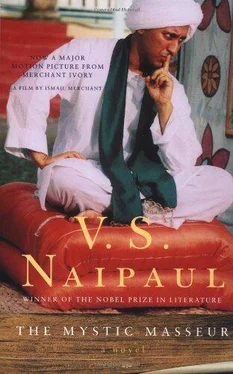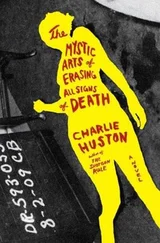‘Man, I take back all the bad things I say and think about you. Today you make me feel really nice. Soomintra could keep she shopkeeper and she money. But, man, don’t again ask me to let down my hair and go through all that rigmarole again.’
‘We not going to do that again. I only wanted to make sure this time. It make them feel good, you know, hearing me talk a language they can’t understand. But it not really necessary.’
‘Manwa, I did see the cloud too, you know.’
‘The mother see one devil, the father forty little devil, the boy see one cloud, and you see one cloud. Girl, whatever Suruj Mooma say about education, it have it uses sometimes.’
‘Oh, man, don’t tell me you use a trick on them.’
Ganesh didn’t say.
There was no report of this incident in the newspapers, yet within two weeks all Trinidad knew about Ganesh and his Powers. The news went about on the local grapevine, the Niggergram, an efficient, almost clairvoyant, news service. As the Niggergram noised the news abroad, the number of Ganesh’s successes were magnified, and his Powers became Olympian.
The Great Belcher came from Icacos, where she had been mourning at a funeral, and wept on Ganesh’s shoulder.
‘At long last you find your hand,’ she said.
Leela wrote to Ramlogan and Soomintra.
Beharry came to Ganesh’s house to offer his congratulations and make up his quarrel. He conceded that it was no longer fitting that Ganesh should go to the shop to talk.
‘From the first Suruj Mooma believe that you had some sort of Powers.’
‘So I did feel too. But ain’t it strange though that for so long I did feel I had a hand for massaging people?’
‘But you was dead right, man.’
‘How you mean?’
Beharry nibbled. ‘You is the mystic massager.’
8. More Trouble with Ramlogan
WITH IN A MONTH Ganesh was getting as many clients as he could handle.
He had never imagined there were so many people in Trinidad with spiritual problems. But what surprised him even more was the extent of his own powers. No one could lay evil spirits better, even in Trinidad, where there were so many that people had acquired especial skill in dealing with them. No one could tie a house better, bind it, that is, in spiritual bonds proof against the most resolute spirit. If he ran up against a particularly tough spirit there were always the books his aunt had given him. So, balls-of-fire, soncouyants, loups-garoux, all became as nothing.
In this way he made most of his money. But what he really liked was a problem which called for all his intellectual and spiritual strength. Like the Woman Who Couldn’t Eat. This woman felt her food turn to needles in her mouth; and her mouth actually bled. He cured her. And there was Lover Boy. Lover Boy was a Trinidad character. Racehorses and racing-pigeons were named after him. But it was an embarrassment to his friends and relations that a successful racing-cyclist should fall in love with his cycle and make love to it openly in a curious way. He cured him too.
So, Ganesh’s prestige had risen until people who came to him sick went away well. Sometimes even he didn’t know why.
His prestige was secured by his learning. Without this he might easily have been lumped with the other thaumaturges who swarmed over Trinidad. They were nearly all fakes. They knew an ineffectual charm or two but had neither the intelligence nor sympathy for anything else. Their method of tackling spirits remained primitive. A sudden kick in the back of a person possessed was supposed to take the spirit by surprise and drive it out. It was because of these ignorant people that the profession had a bad name. Ganesh elevated the profession by putting the charlatans out of business. Every obeah -man was quick enough to call himself a mystic, but the people of Trinidad knew that Ganesh was the only true mystic in the island.
You never felt that he was a fake and you couldn’t deny his literacy or learning — not with all those books. And he hadn’t only book-learning. He could talk on almost any subject. For instance, he had views about Hitler and knew how the war could be ended in two weeks. ‘One way,’ he used to say. ‘Only one. And in fourteen days, even thirteen — bam! — no more war.’ But he kept the way a secret. And he could discuss religion sensibly as well. He was no bigot. He took as much interest in Christianity and Islam as in Hinduism. In the shrine, the old bedroom, he had pictures of Mary and Jesus next to Krishna and Vishnu; a crescent and star represented iconoclastic Islam. ‘All the same God,’ he said. Christians liked him, Muslims liked him, and Hindus, willing as ever to risk prayers to new gods, didn’t object.
But more than his powers, learning, or tolerance, people liked his charity. He had no fixed fee and accepted whatever was given him. When someone complained that he was poor and at the same time persecuted by an evil spirit, Ganesh took care of the spirit and waived the fee. People began to say, ‘He not like the others. They only hot after your money. But Ganesh, he is a good man.’
He was a good listener. People poured out their souls to him and he didn’t make them feel uncomfortable. His speech became flexible. With simple folk he spoke dialect. With people who looked pompous or sceptical or said, ‘Is the first time in my life I come to anybody like you,’ he spoke as correctly as possible, and his deliberate delivery gave weight to what he said and won confidence.
So clients came to Fuente Grove from every corner of Trinidad. Soon he had to pull down the book-shed and put up a canvas-roofed bamboo tent to shelter them. They brought their sadnesses to Fuente Grove, but they made the place look gay. Despite the sorrow in their faces and attitudes they wore clothes as bright as any wedding crowd: veils, bodices, skirts all strident pink, yellow, blue, or green.
The Niggergram had it that even the Governor’s wife had consulted Ganesh. When he was asked about this he grew stern and changed the subject.
On Saturdays and Sundays he rested. On Saturday he went to San Fernando and bought about twenty dollars’ worth of books, almost six inches; and on Sunday, from habit, he took down Saturday’s new books and underlined passages at random, although he no longer had the time to read the books as thoroughly as he would have liked.
On Sunday, too, Beharry came in the morning, to talk. But a change had come over him. He seemed shy of Ganesh and wasn’t as ready with talk as before. He just sat on the verandah and nibbled and agreed with everything Ganesh said.
Now that Ganesh had stopped going to Beharry’s, Leela began. She had taken to wearing a sari and it made her look thinner and frailer. She spoke to Suruj Mooma about Ganesh’s work and her own fatigue.
As soon as Leela left, Suruj Mooma exploded. ‘Suruj Poopa, you was listening to she? You see how Indian people does get conceited quick quick? Mind you, it ain’t he I mind, but she. You hear all that big talk she giving we about wanting to break down the old house and build up a new one? And why all this damn nonsense about wearing sari? All she life she knocking about in bodice and long skirt, and now she start with sari?’
‘Man, was your idea Ganesh should wear dhoti and turban. It ain’t have anything wrong if Leela wear sari.’
‘Suruj Poopa, you ain’t have no shame. They does treat you like dog and still you sticking up for them. And too besides, he wearing dhoti and Leela wearing sari is two different things. And what about the other set of nonsense she sit down on she thin tail here and giving we? All about feeling tired and wanting holiday. She ever had holiday before? Me ever had holiday? Ganesh ever had holiday? You ever had holiday? Holiday! She working hard all the time cleaning out cow-pen and doing a hundred and one things I wouldn’t dirty myself doing, and we ain’t hear not one single squeak about tiredness and holiday. Is only because she feeling a little money in she purse that she start with this nonsense, you hear.’
Читать дальше












